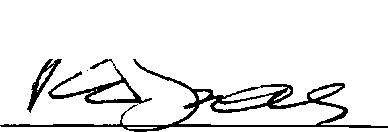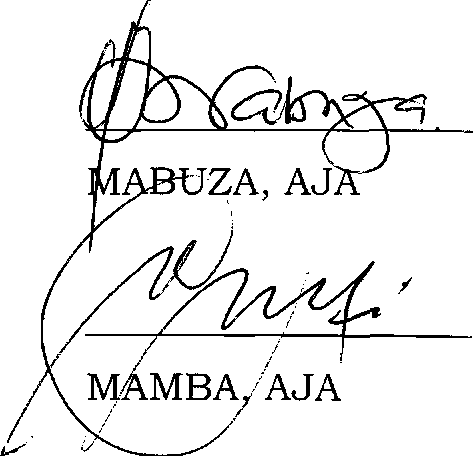2
IN THE INDUSTRIAL COURT OF APPEAL
HELD AT MBABANE APPEAL CASE NO. 5/2008
In the matter of
SWAZILAND COMMERCIAL AND
ALLIED WORKERS UNION Appellant
vs
DOLLY SIBANYONI CORAM
For the Appellant For the Respondent
Respondent
BANDA, JP MABUZA, AJA MAMBA, AJA
Mr. S.M. Kubheka Mr. D.S. Madau
JUDGMENT 17 AUGUST 2009
BANDA, CJ
[1] This is an appeal against the judgment of the President of the Industrial Court delivered on 17th June 2008. The President found that the appellant did not prove the act of dishonesty on the part of the respondent and accordingly further found that the termination of the respondent's employment was substantively unfair. The Court a quo proceeded to award the amounts claimed. An order for costs was made against the appellant.
[2] An appeal to this Court is governed by the provisions of Section 19(1) of the Industrial Relations Act 2000 as amended. That section provides as follows :-
"19(1) There shall be a right of appeal against the decision of the Court on question of law to the Industrial Court of Appeal."
An appeal to this Court can only proceed on questions of law and not on questions of fact.
[3] The respondent was employed by the appellant on 7th February 1988 as an Office Secretary. Her duties included the collection of subscription fees from members of the appellant Trade Union Organisation. It was common cause in the Court a quo that the respondent was an employee to whom Section 35(2) of the Employment Act applied. Section 35(2) provides as follows:-
"35(2) No employer shall terminate the services of an employee unfairly."
And Sub-Section (3) sets out the circumstances in which the termination of an employee's services shall be deemed to be unfair.
[4] The grounds of appeal as set out in the Notice of Appeal contend as follows :-
1. AD MERITS
The President erred in finding that there was an established practice allowing the respondent to collect members' subscriptions and utilize them as respondent did;
The President failed to take into account the evidence of Thobile Ndlangamandla on the established practice;
The President erred in finding that accounting procedures were established and implemented with the appointment of Mr. Ndlangamandla as Secretary General;
The President erred in finding that the Act of dishonesty was not proved;
The President erred in finding that "if the dues were spent on office expenses as she claims, with the knowledge and consent of the Secretary General who ran the office, then she is not guilty of misappropriation."
The President failed to consider that if the Secretary General had known and consented to spending the dues in the manner alleged, he would not have pressed charges against the respondent.
2. AD COSTS
The President erred in awarding costs to the respondent inasmuch as the practice of the Industrial Court is not to grant costs except under exceptional circumstances.
The President therefore erred in awarding costs without stating the exceptional circumstances that warrant such award.
[5] Mr. Kubheka has submitted that the appellant had discharged the onus of proof of the misconduct as stipulated under the provisions of Sections 36 and 42(a) & (b) of the Employment Act as amended. He contended, therefore, that in the circumstances and on the evidence which was adduced at the trial it was fair and reasonable to terminate the respondent's services. It is also Mr. Kubheka's contention that there was no evidence before the Court a quo to support the findings and conclusion of law which the learned President made. Mr. Kubheka has, further, submitted that the decision of the Court a quo was wrong and that this appeal should be upheld with costs.
[6] Section 42(2) of the Employment Act provides for the person who bears the burden of proof. Sub-Section 2 of the Act provides as follows:-
" 42(2) The services of an employee shall not be considered as having been fairly terminated unless the employer proves -
that the reason for the termination was one permitted by Section 36; and
that taking into account all the circumstances of the case, it was
reasonable to terminate the services of the employee."
[7] It is clear that the appellant had to prove not only that the termination was one which was permitted by Section 36 of the Employment Act, but also that taking into account all the circumstances of the case, it was reasonable to terminate the services of the employee.
[8] The respondent admitted that she collected the subscriptions from the appellant's members but suggested that she used it on the business of the appellant's organisation. She stated that this was the accepted procedure which was known by the Secretary General at the time, Mr. Selby Dlamini. She agreed that she used the money to buy office materials and that she would buy whatever was required using the money collected. Further she stated that she would sometimes use the money for travelling expenses and that she kept all the receipts. What was crucial in this evidence by the respondent was her statement that this was the accepted procedure and that the Secretary General, at the time, was aware of it and this was Mr. Selby Dlamini. And it was only Mr. Dlamini who could have dislodged the respondent's contention that what she did was the accepted practice and procedure at the appellant's office.
The evidence on the papers indicated that Mr. Dlamini refused to come and testify. The duty to prove that the respondent was guilty of an act of dishonesty lay squarely on the appellant and it is idle for them to criticise the learned President when he found as follows:-
"In the absence of evidence from Selby Dlamini, the applicant's version of an established practice of expenditure of cash subscriptions on office expenses was not rebutted. Sceptical as we are of this version, we are unable to find that such a practice never existed if the Secretary General at the time is not prepared to come to court and deny it.
It is not correct for the appellant to contend that the learned President failed to take into account the evidence of Thobile Ndlangamandla on the established practice. At page 4 paragraph 14 of the judgment the learned President did consider the evidence of Thobile when he said:-
"The respondent also called Nthabile Ndlangamandla. She is employed by the respondent as a messenger. She confirmed that the applicant used to collect members dues from Direct Distributors. She said it was normally her duty to
collect subscriptions and she did not know who assigned the applicant to collect from Direct Distributors. She said that there were occasions when cash from subscriptions were used for office expenses, for instance to pay the telephone bill to avoid disconnections. She said normal office expenses were paid out of petty cash, which was in the custody of the Secretary General."
It is significant to note that even Thobile Ndlangamandla supports what the respondent said on the use of the subscription money collected.
It is also important to note that Thobile was a mere messenger and she was not the competent person who could tell the court about the established practice and procedure that was followed in the appellant's organisation. It was very easy for the appellants to rebut the respondent's version by merely calling Selby Dlamini and they did not for whatever reason. That is the risk they ran and they cannot complain when the court a quo stated as follows:-
"If the dues were spent on office expenses as she claims, with the knowledge and consent of the Secretary General who ran the office, then she is not
guilty of misappropriation.
[12] The duty to prove an act of dishonesty against the respondent lay on the appellants and this they evidently failed to discharge. This appeal must, therefore, fail with costs.
[13] The order for costs is always a matter that lies within the discretion of the Court. That discretion must, of course, be exercised properly and judicially. Mr. Kubheka did not point out any impropriety that the learned President committed when he ordered costs against the appellant. I am unable to say that the discretion was not properly exercised. The order of the Court will be as follows:-

The appeal is dismissed with costs.The order of costs made in the Court a quo is confirmed. ^'^^^

I Agree
I Agree
